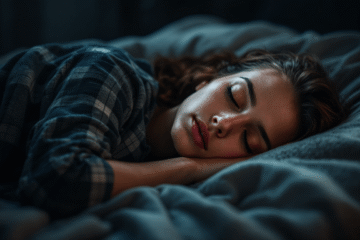One of the most crucial aspects of maintaining good health is getting enough quality sleep. Unfortunately, many people struggle with falling asleep and staying asleep, which can lead to a host of physical and mental health problems. In this article, I will be sharing some valuable tips and techniques to help you improve quality sleep, from creating a relaxing sleep environment to establishing a sleep routine that works for you. Additionally, I will be discussing the best foods and drinks to consume (and avoid) before bedtime, as well as natural remedies and relaxation techniques to help you fall asleep faster.
Quality Sleep – Tips for Better Restful Nights
Why a good night’s sleep is essential for your health and wellbeing
Getting a good night’s sleep is vital for our health and well-being. Sleep plays an important role in maintaining a healthy immune system, repairing and rejuvenating our bodies, and consolidating memories. When we sleep, our body repairs itself from the day’s wear and tear, and our brain processes the information we’ve taken in during the day. Without enough sleep, we can experience a range of negative effects on our physical and mental health.
Sleepon is the ultimate game-changer in the world of sleep management!
Sleep deprivation has been linked to increased risk of heart disease, stroke, obesity, diabetes, depression, anxiety, and even certain types of cancer. Moreover, lack of sleep can lead to decreased productivity and cognitive impairment. Therefore, it’s essential to make sure we’re getting enough quality sleep each night to support our overall health and well-being.
Tips to create a relaxing sleep environment
Creating a relaxing sleep environment is essential to ensure a good night’s rest. One way to achieve this is by keeping the bedroom dark, quiet, and cool. Use blackout curtains or an eye mask to block out any light, and consider using earplugs or a white noise machine to drown out any noise. A comfortable mattress and pillows are also crucial for a restful sleep. Make sure your bedding is clean and fresh, and choose materials that suit your preferences.
Avoid using electronic devices in bed as the blue light they emit can interfere with your body’s natural sleep rhythms. Instead, read a book or practice relaxation techniques such as meditation or deep breathing exercises. Lastly, keep the bedroom clutter-free and well-organized to promote a calm and peaceful atmosphere. By implementing these tips, you can create a sleep-friendly environment that will help you drift off into a restful slumber.
Go2Sleep 3: The Ultimate Sleep Companion
The Go2Sleep 3 revolutionary home sleep monitor is designed to monitor and improve your sleep quality with its comfortable, widened ring holder and advanced algorithms for precise monitoring of blood oxygen, heart rate, and blood glucose.
How to establish a sleep routine that works for you
Establishing a sleep routine that works for you is crucial to improving your sleep quality. Firstly, set a consistent bedtime and wake-up time, even on weekends. This helps regulate your body’s internal clock and improve the quality of your sleep. Secondly, wind down before bed by engaging in relaxing activities such as reading or taking a warm bath. Avoid using electronic devices as the blue light emitted can interfere with your sleep cycle.
Additionally, create a comfortable sleep environment by keeping your bedroom dark, quiet, and cool. Invest in a comfortable mattress and pillows that support your sleeping position. Finally, avoid napping during the day as it can disrupt your sleep at night. It may take some time to establish a routine that works for you, but once you do, it will greatly improve the quality of your sleep and overall health and well-being.
The best foods and drinks to consume (and avoid) before bedtime
What you eat and drink before bed can significantly affect the quality of your sleep. Experts recommend avoiding foods and drinks that contain caffeine, such as coffee, tea, and chocolate, as well as alcohol and spicy or heavy meals. Instead, opt for foods that promote relaxation and contain sleep-inducing nutrients. For example, dairy products like milk and cheese are rich in tryptophan, an amino acid that helps produce serotonin, a neurotransmitter that promotes sleep.
Additionally, cherries, bananas, nuts, and seeds are good sources of magnesium and potassium, which help relax muscles and calm the mind. Herbal teas like chamomile, valerian root, and lavender can also aid in relaxation. It’s important to note that eating a large meal close to bedtime can disrupt digestion and cause discomfort during sleep. Therefore, it’s best to eat a light snack at least 2 hours before bedtime. By making simple changes to your diet before bed, you can improve the quality of your sleep and wake up feeling more refreshed in the morning.
Sleepon Blue Light Blocking Glasses
Sleepon Blue Light Blocking Glasses are designed for the modern lifestyle, providing essential protection against harmful blue light emitted by screens. These stylish glasses help reduce eye strain, improve sleep quality, and enhance overall visual comfort.
Natural remedies and relaxation techniques to help you fall asleep faster
If you’re struggling to fall asleep at night, several natural remedies and relaxation techniques can help you drift off faster. One popular method is meditation, which involves clearing your mind of racing thoughts and focusing on your breath. This can help reduce anxiety and promote relaxation, making it easier to fall asleep. Another effective technique is progressive muscle relaxation, where you tense and then relax each muscle group in your body, starting from your toes and working your way up to your head. This can help release tension and calm your mind.
Herbal remedies such as chamomile tea, lavender oil, and valerian root are also known for their calming properties and can be consumed before bedtime. Additionally, limiting screen time before bed, avoiding caffeine and alcohol, and creating a comfortable sleep environment can all contribute to better sleep quality. By incorporating these natural remedies and relaxation techniques into your routine, you may find it easier to fall asleep faster and enjoy a more restful night’s sleep.
As we conclude this article, it’s important to remember that a good night’s sleep is essential for our health and well-being. By creating a relaxing sleep environment, establishing a sleep routine that works for us, consuming the right foods and drinks before bedtime, and using natural remedies and relaxation techniques, we can improve the quality of our sleep. However, it’s important to note that everyone’s sleep needs are different, and what works for one person may not work for another. It’s worth taking the time to experiment with different strategies to find what works best for you.
Remember that improving your sleep isn’t just about feeling well-rested; it can also have positive impacts on your mental and physical health. So why not try some of these tips tonight and see how they work for you?
Frequently Asked Questions:
What natural remedies and relaxation techniques can help me fall asleep faster?
Practicing meditation, progressive muscle relaxation, and using herbal remedies like chamomile tea, lavender oil, or valerian root can promote relaxation. Limiting screen time before bed and creating a calming environment are also effective ways to improve sleep onset and quality.
What foods and beverages should I avoid before bedtime, and what are good alternatives?
Avoid caffeine, alcohol, spicy, or heavy meals before bed, as they can disrupt sleep. Instead, opt for light snacks rich in sleep-promoting nutrients such as dairy, cherries, bananas, nuts, and herbal teas like chamomile or lavender, which can help relax your body and mind.
What are some tips for establishing an effective sleep routine?
Establish a consistent bedtime and wake-up time, even on weekends. Wind down before sleep with relaxing activities like reading or taking a warm bath, avoid electronic devices, keep your sleeping environment comfortable, and refrain from napping during the day to improve sleep quality.
How can I create a relaxing sleep environment?
To create a relaxing sleep environment, keep your bedroom dark, quiet, and cool by using blackout curtains, earplugs, or white noise. Use a comfortable mattress and pillows, keep your bedding clean and suitable for your preferences, avoid using electronic devices before bed, and maintain a clutter-free, peaceful space.
Why is a good night’s sleep essential for my health and well-being?
A good night’s sleep is vital for maintaining a healthy immune system, repairing and rejuvenating the body, and consolidating memories. Lack of sleep can increase risks of heart disease, stroke, obesity, diabetes, depression, anxiety, and certain cancers, as well as decrease productivity and impair cognitive function.
References:
- Medic, Goran, et al. “Short- and Long-Term Health Consequences of Sleep Disruption.” Nature and Science of Sleep, vol. 9, 2017, pp. 151–61.
- Worley, Susan L. “The Extraordinary Importance of Sleep”. The Extraordinary Importance of Sleep, 2018. NCBI.
- Chaput, Jean-Philippe, et al. “Sleeping Hours: What Is the Ideal Number and How Does Age Impact This?” Nature and Science of Sleep, vol. 10, 2018, pp. 421–30.
- ASA Authors & Reviewers: Sleep Physician at American Sleep Association. Reviewers and Writers Board-certified sleep M.D. physicians, scientists, editors, and writers for ASA. “What Is Sleep & Why Is It Important for Health?” American Sleep Association, 27 July 2021.
- “Sleep Tips: 6 Steps to Better Sleep.” Mayo Clinic, 17 Apr. 2020.
- Suni, Eric. “What Happens When You Sleep?” Sleep Foundation, 30 Oct. 2020.
- Mandal, Ananya, MD. “What Is Sleep?” News-Medical.Net, 30 Jan. 2020.
Body, Mind, And Soul For A Fulfilled Life!






